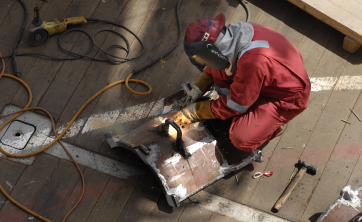
The Importance of Regular Maintenance for Industrial Safety Equipment
17th April, 2023Industrial safety equipment plays an important role in protecting workers from hazardous situations. From firefighting gear to gas detectors, these tools are designed to keep employees safe while on the job. However, simply having this equipment on hand is not enough. Regular maintenance is crucial for ensuring that it functions properly and effectively when needed most. In this blog post, we'll explore the importance of regular maintenance for industrial safety equipment and why it matters so much in keeping workers safe from harm!
What is industrial safety equipment?
Industrial safety equipment is a critical component of any workplace where hazardous materials, tools, or conditions are present. This type of equipment includes everything from hard hats and safety glasses to respirators and earplugs that protect workers' eyes, ears, lungs, and head.
For example, fire extinguishers are a common piece of industrial safety equipment found in workplaces. They can put out fires before they have the chance to spread and cause severe damage. Another essential item is personal protective equipment (PPE), which includes gloves, boots, helmets, goggles or face shields designed to guard against hazards like chemicals or heat.
Other important industrial safety devices include gas detectors that monitor air quality for dangerous gases such as carbon monoxide or hydrogen sulfide - this kind of device may be necessary in confined spaces like tunnels or mines where air circulation is limited.
Industrial Safety Equipment provides protection for employees while working on potentially hazardous tasks.
What are the benefits of regular maintenance for industrial safety equipment?
Regular maintenance is essential for industrial safety equipment as it ensures that the tools are in good working condition and can perform their intended functions. One of the most significant benefits of regular maintenance is that it increases the lifespan of these devices. When tools are well-maintained, they tend to last longer than those which have not been serviced regularly.
Another benefit of regular maintenance for industrial safety equipment is that it minimizes downtime caused by breakdowns or defects. By identifying and fixing potential issues early, businesses can avoid costly work stoppages resulting from faulty tools.
Moreover, properly maintained safety equipment reduces the risk associated with workplace accidents and injuries. For instance, ensuring that fire extinguishers are in good working condition means workers can quickly put out fires before they cause extensive damage.
Furthermore, regularly servicing industrial safety equipment ensures compliance with regulatory requirements set by government agencies such as OSHA. Failing to meet these regulations could result in hefty fines or even legal action against your business.
Investing time and resources into maintaining industrial safety equipment pays off both financially and regarding employee welfare.
How often should industrial safety equipment be serviced?
Regular maintenance of industrial safety equipment is crucial to ensure that it functions properly when needed. But how often should this maintenance be conducted?
The frequency of servicing depends on the type of equipment and its usage. For instance, fire extinguishers should be checked monthly for pressure levels and damage, while fall protection systems may require annual inspections by a qualified professional.
In addition to these routine checks, it's important to conduct more thorough servicing at regular intervals. This could involve testing alarms, checking wiring and connections, lubricating moving parts or replacing worn components.
It's always best to follow the manufacturer's guidelines for specific equipment as they will provide detailed instructions on recommended service schedules. However, environmental factors such as exposure to harsh conditions or heavy use can also impact the frequency of required maintenance.
Ultimately, regular servicing not only ensures compliance with regulations but also provides peace of mind that your safety equipment is ready when you need it most.
What are the consequences of not servicing industrial safety equipment?
Neglecting regular maintenance for industrial safety equipment can lead to dire consequences. First and foremost, it jeopardizes the safety of workers in potentially dangerous work environments. It increases the chances of accidents, injuries, and even fatalities.
Furthermore, not servicing industrial safety equipment can result in decreased efficiency and effectiveness of the equipment itself. If they are not properly maintained and calibrated, they may malfunction when needed most. This can cause delays or complete shutdowns of production processes that rely on these safety devices.
Not only does this compromise worker safety but also negatively impacts business operations as well as productivity levels overall leading to financial losses.
Conclusion
Regular maintenance is crucial for ensuring that industrial safety equipment, including firefighting and other safety gear, functions effectively. By implementing a regular servicing schedule, companies can ensure that their employees are protected in the event of an emergency. Regular maintenance reduces the risk of equipment failure and extends the lifespan of critical safety gear.
Ignoring regular maintenance can lead to significant consequences such as risking employee injury or death, damaging expensive equipment, and even causing fires or explosions. In addition to these serious risks, non-compliance with regulations could result in legal fines and reputational damage.
Remember: industrial safety equipment must be regularly inspected by qualified personnel who have received training on how to identify potential defects or hazards. As part of any company's commitment to health and safety standards compliance and maintaining a safe working environment for its employees - it’s essential for all businesses to prioritize regular service checks on their industrial safety equipment.
By prioritizing this aspect of your business operations – you're not only protecting your staff but also safeguarding against negative outcomes such as financial loss due to lawsuits from workplace accidents.
In conclusion: The importance of regular maintenance cannot be overstated when it comes to industrial safety equipment like firefighting gear. Taking steps now will help protect your workers while minimizing costs associated with negligence over time!




 Our Blog
Our Blog